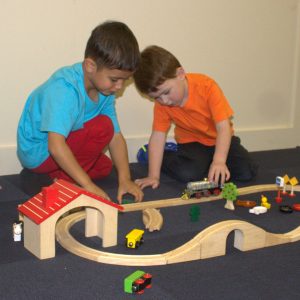 Some children develop social skills easily and naturally while others need extra help. How do we know whether kids need help or not? Let's look at typical children's development of some key social skills. This week we will look at preschool children and over the next few weeks we will look at the development of older children.
Some children develop social skills easily and naturally while others need extra help. How do we know whether kids need help or not? Let's look at typical children's development of some key social skills. This week we will look at preschool children and over the next few weeks we will look at the development of older children.
Social and emotional development
Three and four year old's are learning to understand other people, other's emotions and their own emotions.
Typically developing preschoolers can:
- Show interest in other people and their facial expressions
- Understand other people have different feelings about the same things
- Beginning to develop the basics of sympathy
- Read facial expressions and experiment to make different faces.
- Understand the difference between feeling happy, sad angry and scared.
- Use simple words to describe these feelings.
- Understand the cause of their feelings.
- Begin to learn how to manage their emotions.
- Are helped by structures, limits and routines to manage intense feelings.
- Are able to sooth themselves when they are upset.
- Are able to feel secure when adults are not present.
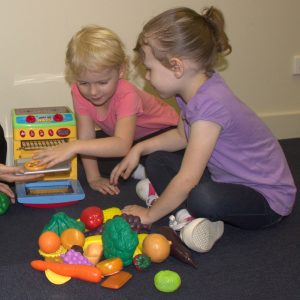 By four years of age children are:
By four years of age children are:
- Able to understand social rules.
- Developing a sense of right and wrong.
- Learning to be assertive.
- Still having times when their emotions are quite strong and may have irrational fears.
- May do some unwanted behaviours such as biting or show regression with behaviour when having string emotions or frustration.
- Enjoy stories and imaginative play and can make up stories.
- Accept magical explanations for things that happen.
If you are concerned about your child's social development, we have a range of coordinated services that may be helpful.
Social communication.
Children's understanding of how to use communication in different social situations and with different people develops rapidly in the preschool years.
Preschool children are:
- Developing an understanding of adults intentions.
- Beginning to understand indirect requests such as "would you like to pick up your toys?" Beginning to use hints to get other people to do things "that cake looks yummy" Understand when they need to ask permission for things.
- Give other people information and correct others when they are wrong.
- Beginning to have longer conversations of up to 3 to 5 turns.
- Request further information to keep a topic of conversation going.
- Still switch topics quickly at times.
- Beginning to speak in a different way with younger children
- Able to use different styles of communicating when talking in role-play.
- Communicate more appropriately with strangers.
- Use language for storytelling and take other people’s perspective.
- Beginning to use language for teasing jokes and pretending.
From four years of age children can: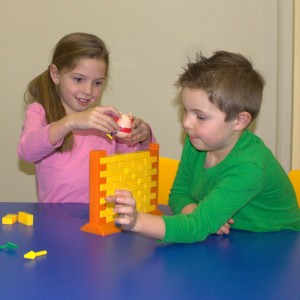
- Have long and detailed conversations.
- Talk about past events
- Use language to reason, predict, express empathy and show imagination.
- Becoming more skilled at using hints "It's hot today (to go in the pool).
- Reference appropriately and add information that is needed for the listener to understand what they are saying about something the listener has not experienced.
- Understand how to start conversations and to politely interrupt adults.
- Still mix some fantasy with reality when telling stories.
If you are concerned about your child's communication skills, speech pathology may help.
Developing friendships
Preschool children are keen to interact with others of their age and a learning how to communicate and play effectively together.
Children from three to five years of age:
- Can share, help others and cooperate.
- Need adult support to negotiate conflicts.
- May want to please and be like their friends.
- Will be pleased to good things happen to other people.
- Play together and share the same toys and interests with both boys and girls.
- Play well with other children but their friendships may frequently change.
- Begin to understand other people have rights when they play together.
- Agree to follow rules.
- May enjoy competing with others or tricking them.
- Are however beginning to show some empathy.
Are able to pretend play things that they have not experienced.
- Understand the difference between real and imaginary objects
- Can pretend in different roles with play reflecting the voices, actions and perspectives of other characters.
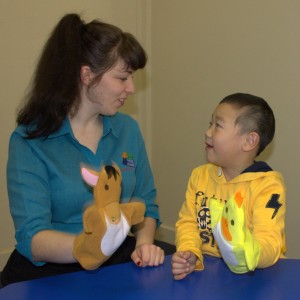 If you are concerned that your child struggles to play with others our play skills groups may help.
If you are concerned that your child struggles to play with others our play skills groups may help.
Self control and managing behaviour
Between three and four years children develop increased attention, self-control, concentration and the ability to control their impulses.
Preschool children are:
- Able to wait for rewards.
- Becoming less impulsive.
- Able to understand rules and change their behaviour when rules are seen as necessary.
- Stop themselves from doing behaviours which they have been told not to do such as touching hot things or hitting others.
- Do simple chores around the house with support.
By four years of age children:
- Understand that there are different ways to do things
- Begin to make better choices.
- Are able to think of new ideas.
- Are able to delay some behaviours and choose actions that will lead to a better reward.
- Understand when they have made a mistake.
- May speak out loud to control their own behaviour.
- Are developing simple planning skills
- Understand the importance of following rules.
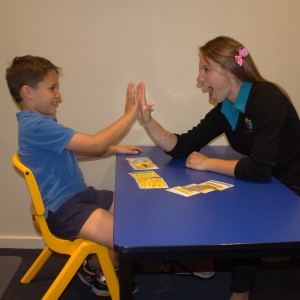 Concerned about your child's development? Talking Matters provides assessment, diagnosis, therapy and support for children with a wide range of needs including developmental delays, learning and literacy challenges, speech and language delays, motor skill and sensory issues and children on the autism spectrum and their families.We are providers under the NDIA.
Concerned about your child's development? Talking Matters provides assessment, diagnosis, therapy and support for children with a wide range of needs including developmental delays, learning and literacy challenges, speech and language delays, motor skill and sensory issues and children on the autism spectrum and their families.We are providers under the NDIA.
We provide speech pathology, occupational therapy, social skills and play skills groups. To find out more about our services and our team visit our website.
We have a range of group programs each school holidays including groups to help preschool children develop social and pretend play skills. browse our website or call our office on (08) 8255 7137 for details.
Our website has a range of downloadable information sheets, printable activities and useful links. To connect with our community of families, therapists and educators join us on Facebook, Twitter and Pinterest.
References:
Hierarchy of Social/Pragmatic Skills as Related to the Development of Executive Function created by Kimberly Peters, Ph.D.
Components of Social Communication ASHA
Social Skills: What are they, and why are they important?
Supporting social communication development through relationships by Bernadette Feeney, Speech Pathology Australia Workshop Notes Adelaide 7 July 2016
Related Blog Posts
If you liked this post you may also like:
Visuals for older kids
Why 20% of kids struggle!
Get ready for sounds!
4 ways to first words



